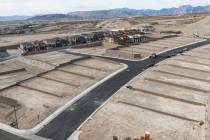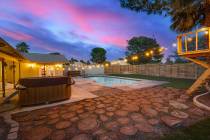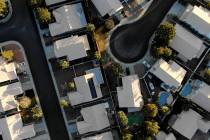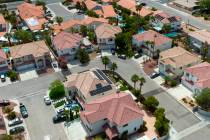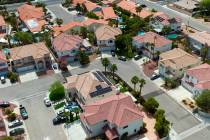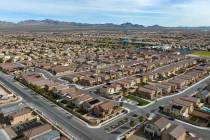‘Toxic neighbors’ hurting community home values, professors say
The spillover from “toxic neighbors” is dragging home values down by 20 percent to 33 percent for entire neighborhoods in Las Vegas, a report from UNLV’s Lied Institute of Real Estate Studies found.
When a neighborhood has 40 or more homes go to foreclosure, it reaches a “tipping point,” said Nasser Daneshvary, director of the institute at University of Nevada, Las Vegas. That’s when homes not in foreclosure or default sell for about the same price as those that are.
“Foreclosed and short-sale homes are toxic neighbors because they have a negative impact on the value of all the homes around them,” Daneshvary said. “While your home may be healthy, it’s the same price of the home down the street in foreclosure.”
Delinquent homeowners have little incentive to improve or invest in properties that may be going back to the bank, he said. Blight sets in as homes are neglected, abandoned and vandalized, which makes the neighborhood less attractive to prospective buyers.
Las Vegas is among the nation’s leader in foreclosure filings per household, mortgage delinquency rates and “underwater” homeowners who owe more than their homes are worth. Some are doing short sales, a lender-approved sale for less than the principal mortgage balance. Others simply walk away from their financial obligations, a business decision known as “strategic default.”
That brings values down by an average of $78,000 even on homes that are not in default or foreclosure, Daneshvary estimated.
He and colleague Mike Clauretie, both economics professors at UNLV, compared traditional arm’s-length home sales from July 2008 through June 2009 with foreclosures and short sales within a half-mile radius in the prior six months.
They found a 20 percent decrease in value that fell to 33 percent when the declining trend is allocated for a one-year period.
Housing analyst Dennis Smith of Las Vegas-based Home Builders Research said that’s a good average, but the negative effect could be more than 50 percent in some neighborhoods.
“I know someone who paid $750,000 and it’s now worth $400,000. That’s over 40 percent. It’ll vary from neighborhood to neighborhood,” he said. “Depending on those who bought at the peak versus those who didn’t, the percentage would be much less.”
Daneshvary found clusters of neighborhoods with more than 40 foreclosures concentrated in the northernmost areas of the Las Vegas Valley, as well as the northwest and southwest. They’re primarily in newer subdivisions built from 2004 to 2006. Also, many were sold to investors and second-home buyers from California and were never occupied, he said.
Appraisals are based on comparable sales, or recent sales of similar homes within a certain distance. When a neighborhood is dominated by foreclosures and short sales, it drives down values and creates further negative equity, Daneshvary noted.
Foreclosures and short sales account for roughly 75 percent of existing home sales in Las Vegas, the Greater Las Vegas Association of Realtors reported.
The “shadow inventory” of foreclosed homes being held by banks is estimated to be in the millions, leading some analysts to believe prices will decline further as more foreclosures are dumped onto the market. Given stable demand and increased supply, prices of all similar properties will be lower, Daneshvary said.
As the mortgage crisis continues, government officials at all levels are scrambling to find ways to prevent foreclosures and rescue underwater homeowners. Congress will soon be debating how much tax dollars it will take to bail out Fannie Mae and Freddie Mac.
“Why? Haven’t we all paid enough?” Daneshvary asked. “Shouldn’t we just let housing prices free fall until the market corrects itself and let the companies that made these bad loans suffer the consequences?”
Contact reporter Hubble Smith at hsmith@reviewjournal.com or 702-383-0491.









